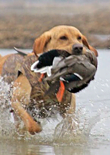How Hunting Dogs Hunt in the Wild
By Sally Gutteridge | Breeds

 Hunting dogs have 25 times more smell receptors than humans do and can smell odors at concentrations that are 100 million times lower than what we can. This great sense of smell is what enables hunting dogs to hunt very well in the wild. We all know that domesticated dogs get their food from their owners, but how do hunting dogs in the wild hunt for their food?
Hunting dogs have 25 times more smell receptors than humans do and can smell odors at concentrations that are 100 million times lower than what we can. This great sense of smell is what enables hunting dogs to hunt very well in the wild. We all know that domesticated dogs get their food from their owners, but how do hunting dogs in the wild hunt for their food?
There are many types of hunting dogs that hunt naturally in the wild, and they all have different hunting techniques. However, most of them follow a general hunting procedure of hunting in a pack. One of the most avid hunting dogs would be the wolves. Understanding how wolves hunt in the wild will provide insight on how other dogs hunt also.
Not only do wolves have a great sense of smell, they’re physically built for hunting in the wild. They have strong, long legs that can outrun the fastest prey and tough jaws to chew up their victim. Their fur also blends into the background making them invisible to their unwitting prey. Besides all that, wolves also have three layers of fur making water run off their fur like they’re waterproof. Not even a group of hunters could out hunt a single wolf.
Even with all this equipment for hunting in the wild, wolves never hunt alone. Instead, they hunt in packs led by the alpha dog or leader of the pack. The alpha dog is the strongest of them all and is like the king. All the other wolves must listen to the alpha during a hunt.
Before a hunt initiates, the pack howls together to warn other packs to stay off their territory. The pack will then search for prey until they find a good victim. Once they find a good meal, the pack then moves in from the opposite direction the wind is blowing. This way the animal will not smell the wolves advancing on it. Once they get close enough to the prey, the chase initiates. A lot of the times the wolves will travel in a single-file.
If the hunt is successful, the wolves will then weaken it by biting the sides of the animal. When the animal is weak enough, the final blow will be given by delivering a strike the throat. Then the wolves feast on their catch. If the hunt is unsuccessful, the pack will then search for another animal. Contrary to popular belief, wolves can go without food for weeks at a time.
Besides wolves, there are many domesticated dogs can be hunting dogs and become an asset to hunters. Some popular breeds that aide hunters include: Terriers, Retrievers, and Spaniels. With the right training, your dog can help you during your hunting expeditions.
Session expired
Please log in again. The login page will open in a new tab. After logging in you can close it and return to this page.
I almost read this as a trust worthy article until I saw you used “there” incorrectly.
Thank you for pointing that out, it was a simple typo, we’ve corrected it.